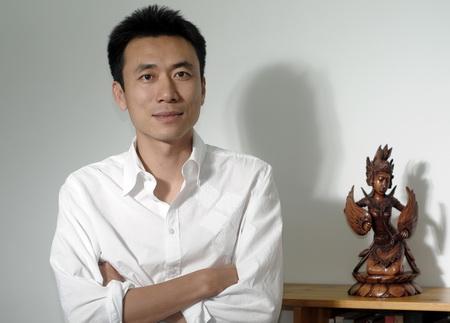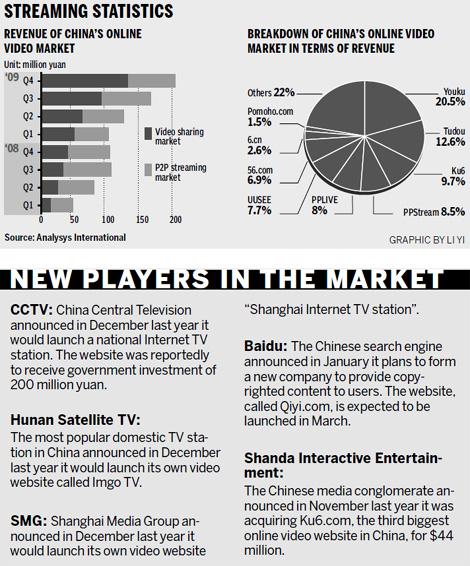As competition heats up in the streaming industry, a relaxed Gary Wang insists Tudou will thrive
Gary Wang comes across as more like a professional game player than his major role as the founder and chief executive of Tudou.com, one of China's largest online video websites.
Even when his company endured a government-led online crackdown on copyrighted video content last year and had to face a group of new giant competitors such as CCTV and Baidu, the 36-year-old chief executive still maintained his calm and confidence rather than submitting to worry or panic, something many had expected.

Gary Wang, founder and CEO of Tudou.com, describes himself as a "world citizen", having studied in the United States and France. PROVIDED TO CHINA DAILY
Wang dropped out from China's rigid education system in the 1990s, but later managed to get his bachelor, master and MBA degrees at the world's best educational institutions. He enjoys hiking and reading and describes himself as a "world citizen". He is also the author of a popular Chinese fiction book that some believe to have described his early days of studying in the United States and France.
As a man who comfortably mixes his work and free time, Wang is happy dealing with business emails while camping during a hike and allows flexible working hour for his employees. As an interviewee he is relaxed to the point of resting his legs on the office table while excitably discussing his favorite books.
Surprisingly, these characteristics, regarded by some as perhaps conceited and arrogant, helped Wang win approval from many investors, one of whom once said he felt "assured" by Wang's attitude towards work and life.
"Doing business is like playing games: You grow up by passing each level and fight with bigger bosses each time," Wang said, sitting in his office in Beijing soon after CCTV and Baidu announced they were establishing their own video websites. "I believe we can survive and thrive."
Although looking at ease, Wang admits that now may be the most difficult time business-wise since he first developed Tudou.com in April 2005. It was one of the first video websites perhaps in the world, considering that YouTube.com was established in Feb 2005.
During the past three months, at least three of China's largest State-owned media groups (CCTV, Hunan Satellite TV and Shanghai Media Group) as well as two domestic Internet giants (Baidu and Shanda) announced plans to establish their own video websites.
Wang's company, backed by foreign venture capital, hasn't yet made a profit so the sudden direct competition from businesses with regulatory and investment advantages was not particularly welcome.
According to figures from research firm Analysys International, the revenue of China's online video market reached 199 million yuan ($29 million) in the fourth quarter of last year, an increase of 96.2 percent compared with the same period of 2008. Major players including Youku.com, Ku6.com and Tudou.com have all announced that their revenues have seen rapid growth and will be able to balance their books in the next couple of years.
However, the global financial crisis in 2008 led to many video websites in China losing investment from foreign venture capital firms. A government-led Internet crackdown launched last year also led to the shutdown of hundreds of Chinese video websites.
"The success of Hulu in the US emboldened Chinese companies and media groups regarding this business model's huge potential," said Edward Yu, chief executive officer of Analysys International. Yu said websites such as Youku.com and Tudou.com have long been accused of offering pirated content uploaded by their users and may need to shift their focus to specific market sectors such as entertainment programming or user-generated content.
Hulu is jointly owned by NBC Universal, Fox Entertainment Group and ABC Inc and allows viewers to stream TV shows over the net free of charge in the US. The website has won over users as well as advertisers from YouTube since its debut in 2007.
For many like Tudou, the arrival of new competitors is akin to a group of scrumpers helping themselves to the ripe grapes one had looked after for years. But Wang said he knew this would happen "from the first day when I established the company".

A webpage from Tudou.com. [Agencies]
He said: "It is natural that big elephants will come when the market matures, but I don't believe that anyone can dominate China's online video market."He denies his firm is in direct competition with content makers such as CCTV and Hunan TV because "the licensed content on Tudou.com only accounts for two to three percent of our total traffic".
Instead, he regards Tudou's biggest rival as Baidu, China's biggest search engine, because "a significant part" of Tudou's traffic comes from Baidu's video search service, and now it is launching its own content.
Liu Ning, an analyst at research firm BDA China, said compared with video sharing websites such as Youku.com and Tudou.com, Chinese video streaming websites such as PPStream, PPLive and Xunlei may be the first to feel the heat.
In 2005, Google acquired YouTube and has provided billions in investment to make it the world's largest video sharing website.
Google's investment, Wang said, gave YouTube a unique advantage over its competitors, making it the world's biggest online video website even though it is still struggling to make a profit.
"The Chinese Internet firms are still small compared with their foreign counterparts, making them less capable of providing enough investment that online video websites require in their early days," Wang said.
However, he added that some Chinese Internet firms are now ready for acquisition. "We have also grown big enough," he said.
Baidu plans to establish an online platform similar to Hulu.com. The firm announced last week that its new video website, called Qiyi.com, will be launched in March.
However, Wang said he didn't think Hulu.com's business model could be successfully copied in China, mainly because the nation lacked dominant copyright owners and because of Chinese users' disparate appetite for video.
He said even CCTV, China's biggest video content maker, accounts for only seven percent of China's soap opera market.
"In the United States, major networks could provide most of the content that American users want," he said.
"But in the Chinese mainland, Internet users want to watch videos from Taiwan province and Hong Kong Special Administrative Region, and the United States, Japan and South Korea."
He said his company plans to stick to user-generated content (UGC), although this often invites copyright disputes and sometimes scares away advertisers, according to the experience of YouTube. "Chinese advertisers are more tolerant of UGC because they don't have any other choice in China where few of the young people spend much time watching TV," he said.
On being asked whether he would sell Tudou, he replied firmly it was "not possible at least in the foreseeable future."







